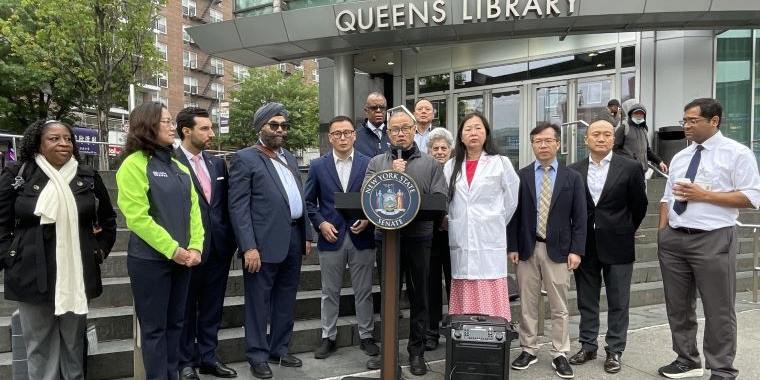
Shocking Rise In Diabetes Among AAPI Community Spurs Call For Life-Saving Legislation To Require Screenings At Lower BMIs
May 23, 2025
-
ISSUE:
- Diabetes
- BMI
- Senator Liu
- S634B

FOR IMMEDIATE RELEASE: Friday, May 23, 2025
Contact: Soojin Choi |347-556-6335| press@johnliusenate.com
Flushing, NY - In recognition of AAPI Heritage Month, State Senator John Liu and Assembly Member Ron Kim today joined with medical professionals to call for the passage of their legislation (S634B/ A1206B) to address the disproportionately high rates of undiagnosed diabetes in AAPI communities. The legislation would require diabetes screenings in accordance with nationally recognized, evidence-based guidelines for AAPIs who have a lower Body Mass Index (BMI) threshold for the illness.
The lawmakers are pushing for legislation that follows national efforts to raise awareness that more than half of Asian Americans with type 2 diabetes, and even more with pre-diabetes, are undiagnosed. Initiatives like the “Screen At 23” Campaign seek to get every Asian American patient with a BMI of 23 or higher screened, as opposed to the standard BMI of 25.
While a BMI of 25 is typically used as the national benchmark for diabetes screening, research has shown that Asian Americans can be at a higher risk of diabetes at BMIs as low as 23. The American Diabetes Association, National Institutes of Health, and Centers for Disease Control have all acknowledged that Asian Americans should be screened for diabetes at a BMI of 23, however most insurance plans still do not currently cover these screenings for patients in this range, leaving many within AAPI communities underdiagnosed and at greater risk of diabetes.
In following nationally recognized, evidence-based guidelines, the legislation would also eliminate deductibles, copayments, coinsurance, and other out-of-pocket costs for screenings at 23 for Asian Americans, ensuring that financial barriers do not prevent early detection. This approach would improve health outcomes for patients by catching the disease early while also reducing long-term costs for insurance providers for diabetes treatment.
During AAPI Heritage Month, the lawmakers joined medical professionals to highlight the growing prevalence of diabetes and prediabetes within AAPI communities and called for the passage of the legislation to address this dangerous public health disparity.
State Senator John Liu stated, “Diabetes is silently devastating our communities, especially Asian Americans who run a high risk of living with this life-threatening disease without even knowing it. It’s time for the insurance industry to catch up with best medical practices by making screenings accessible and free. This will help prevent complications before they start and save lives. During AAPI Heritage Month, it’s especially urgent that we act to protect the health of our families with nationally-recognized, evidence-based care.”
Assembly Member Ron Kim stated, “Underrepresented communities often face unique medical challenges that require empirically-driven guidelines and treatment. Medical studies show that at the same Body Mass Index, Asian Americans have a higher risk of diabetes compared to the general population. Our national guidelines even recommend that members of our community be screened for diabetes at a lower BMI, and it is time for the insurance industry to catch up. We must expand coverage for screenings so that Asian American patients who fall within the vulnerable range receive the medical care they need.”
Kaushal Challa, CEO of Charles B. Wang Community Health Center, stated, “At the Charles B. Wang Community Health Center, we see every day how critical early screening is in preventing diabetes-especially in communities like ours, where the risk begins at lower body weight. This bill is an important step toward aligning insurance coverage with clinical evidence. By lowering the BMI threshold for diabetes screenings from 25 to 23, this legislation will ensure more people get the care they need, when they need it - before it's too late. We commend the state legislators championing this bill and proudly support this effort as a vital step towards better health outcomes for New Yorkers.”
Ziqiang Zhu, MD, Chair of the Association of Chinese American Physicians, stated, “ACAP, representing over 700 licensed medical professionals across New York State, strongly supports this legislation to lower the BMI threshold for mandated diabetes and prediabetes screenings from 25 to 23. Asian Americans are at higher risk for diabetes at lower BMI levels, and current insurance guidelines do not reflect this reality. The American Diabetes Association recommends screenings starting at a BMI of 23 for Asian populations, yet existing policies leave many undiagnosed and vulnerable. This bill aligns insurance coverage with medical evidence, promotes health equity, and supports early intervention to reduce long-term health costs and complications. ACAP urges swift passage of this legislation to ensure fair and effective access to preventive care for all communities.”
Hyun Joon Lee, MD, President of Korean American Physicians Association of New York, stated, “Research shows that diabetes in non-obese Korean Americans can occur at lower BMI levels, yet outdated insurance standards continue to prevent this at-risk population from receiving the care they need. As Korean American physicians, we see firsthand the difficulties faced by patients living with undiagnosed or poorly managed diabetes, often due to inadequate screening and financial barriers. We fully support this long-overdue legislation that will finally address this important issue and save lives in the Korean American, AAPI, and other underserved and underdiagnosed communities.”
George Liu, MD, CAIPA President and CEO, stated, “This legislation aims to improve preventive health care by lowering the BMI threshold for diabetes and pre-diabetes screening coverage from 25 kg/m² to 23 kg/m², specifically addressing disparities in diabetes risk among Asian American communities! Supporting this bill could lead to earlier diagnoses, better health outcomes, and reduced long-term health care costs. This bill promotes equitable, data-driven health care access for all, while addressing long-standing gaps that disproportionately affect Asian American New Yorkers. This legislation deserves full and immediate passage.”
Charles Lopresto, DO, Immediate-Past President, Medical Society of the County of Queens, stated, "This legislation addresses a long-overlooked health disparity among AAPI patients by ensuring insurance coverage for diabetes screenings at a lower BMI. Current universal BMI standards ignore well-established clinical guidelines, leaving this community at risk of undiagnosed diabetes, which can lead to devastating complications. Caught early, diabetes is manageable, making early detection critical to healthy outcomes. This bill is a necessary and evidence-based step toward standardized care and better outcomes for the AAPI community in Queens and across New York State.”
Alex Mitchell, President and Chief Financial Officer of Rendr, stated, “As the largest medical group in the Chinese community, we are committed to advancing value-based care by prioritizing chronic disease prevention and early detection. This bill is an important step forward in recognizing the unique health risks faced by Asian Americans and ensuring they receive timely diabetes screenings. We applaud this effort to expand coverage for preventive care, which aligns with our mission to improve patients' health outcomes, reduce avoidable hospital visits, and lower healthcare costs.”
Monica Billger, Director of State Government Affairs for the American Diabetes Association, stated, "Too often, a diagnosis of type 1 or type 2 diabetes occurs too late. The American Diabetes Association applauds Senator John Liu and Assemblymember Ron Kim's legislation, which would expand critical diabetes and prediabetes screenings at no cost to individuals whose risk factors are reflected in national evidence-based guidelines. Early diagnosis and intervention can help prevent or delay diabetes and improve outcomes. This legislation is an important step in addressing the epidemic of diabetes and its devastating complications.”
Share this Article or Press Release
Newsroom
Go to Newsroom


